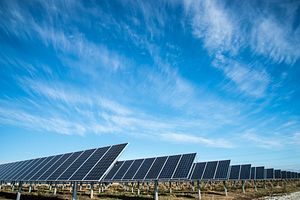Recently, the United Arab Emirates’s leading firm on renewable energy, Masdar, inked an agreement with Pembangkitan Jawa Bali, the subsidiary of Indonesia’s state electricity company Perusahaan Listrik Negara (PLN), on the development of Indonesia’s first floating solar power plant.
Such projects exemplify how the energy partnership between Indonesia and the Gulf is increasingly moving toward renewable energy.
Over the years, energy relations between Indonesia and Gulf countries have been dominated by conventional energy in the form of trade in oil and gas. Indonesia’s imported crude oil supply relies on Saudi oil. From January to November 2019, the value of Indonesia’s crude oil imports reached $4.29 billion with almost 50 percent coming from Saudi Arabia.
At the same time, a number of Gulf nations have also invested in Indonesia’s oil and gas sector. For example, Indonesia’s state-owned oil firm, Pertamina, recently signed a memorandum of understanding (MoU) with the Abu Dhabi National Oil Company (ADNOC) for developing refinery facilities in Balongan. UAE’s oil and gas company, Mubadala, has been involved in oil and gas production activity in Indonesia since 2004, and is currently operating in four blocks. The company also had an agreement with Chandra Asri to develop petrochemical plants worth $2.5 billion. In 2016, Oman’s oil and gas company, Oman Overseas Oil and Gas Operation, signed an agreement with Pertamina to build a new oil refinery in Bontang, East Kalimantan. The refinery is targeted to have a capacity of 300 thousand barrels per day.
Another example comes from Qatar, where its investments can be seen in Indonesia’s largest coal power plant in Paiton. In 2017, Doha also signed a $1 billion head of agreement (HOA) with PLN to develop 800 GW, as well as a floating storage and regasification unit in North Sumatra.
On the other hand, Indonesian investments have also made their way to the Gulf. One key example is Pertamina, which has been trying to acquire an oil and gas block in the UAE to boost the company’s oil and gas production. If realized, this would not be the first of Indonesia’s energy portfolio in the Gulf. Medco Energi won a contract in 2015 to explore Block 56 in Oman, which is estimated to have oil reserves of 370 million barrels.
Today, however, Indonesia-Gulf relations are gradually moving into the renewable energy sector. In 2015, Kuwait and Pertamina signed an MoU to strengthen a cooperation in the renewable field. A more tangible step was taken by the UAE, which has invested in the development of Indonesia’s largest solar power project with a capacity of 145 MW. The project is planned to achieve commercial operation by 2022. Located at West Java, the power plant is expected to supply clean energy to Java, an island with the highest electricity consumption in the country.
Although still limited, there are many opportunities available for both Indonesia and the Gulf states in the renewable energy sector.
The six Gulf Cooperation Council (GCC) countries have an agenda on renewable energy. According to the International Renewable Energy Agency, during 2014 to 2018, GCC nations experienced a quadruple increase of renewable power plant capacity, from 210 MW to 867 MW. The UAE has been the leader in developing renewable power plants, having almost 69% of total GCC’s capacity. Saudi Arabia is ranked second with 89 MW.
Moreover, the development of the world’s largest solar power plant, with capacity of 1,177 MW, in the UAE sets a monumental milestone for the region’s aim and expertises to provide sustainable energy.
This agenda matches with Indonesia’s greening agenda, which has been a priority of the Joko “Jokowi” Widodo administration. Similar with the Gulf countries, Indonesia is blessed with abundant solar potential. Data from Indonesia’s Ministry of Energy and Mineral Resources shows that the country’s solar potential reaches 207.8 GW.
Indonesia has set an ambitious target of 23 percent renewables by 2025; it has been reported that the country only reached 8 percent in 2019.
Jakarta is now drafting more investment-friendly regulations and pricing schemes to reach its renewable energy goal. A new renewable energy bill is also in the national legislation program, aimed to set a legal certainty for investors.
Equally important, Indonesia has also deepened cooperation with the International Energy Agency (IEA) to foster the development of renewable energy in the country. All of these gestures provide an opportunity for investors both locally and globally.
Given the expertise of Gulf countries in solar power, Indonesia’s solar resources could be a potential market for investment. By exploring Indonesia’s growing market in the sector, countries of the Persian Gulf could expand their renewable portfolios.
Furthermore, Indonesia could be the Gulf’s new hub for investments in the wider Southeast Asian renewable energy sector. It is important to note that the Gulf countries, with their “Look East” policy, have been trying to move beyond traditional partners such as the United States and Europe to China and Southeast Asian nations.
Renewable energy could also be a gateway for the Gulf nations to penetrate other sectors in the region.
Despite the opportunities above, Indonesia and the Gulf nations need to be aware of the risks that exist along the way. In May this year, for instance, Pertamina decided to upgrade and expand its 348,000 b/d Cilacap refinery on its own, due to a delayed joint development with Saudi Arabia’s state-controlled Saudi Aramco which fell through.
Diwangkara Bagus Nugraha is an energy researcher at Purnomo Yusgiantoro Center.
Muhammad Zulfikar Rakhmat is a senior academic at Universitas Islam Indonesia.

































